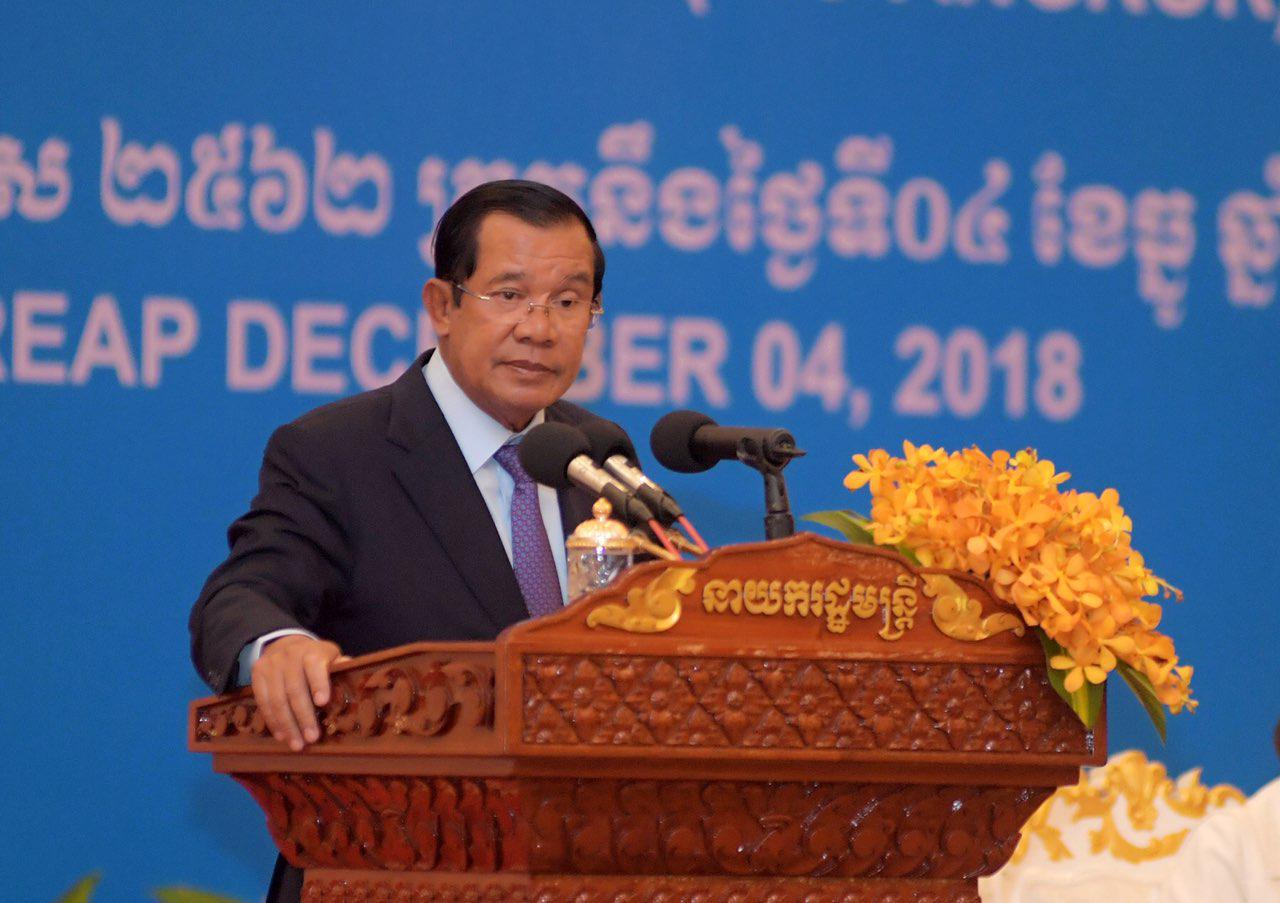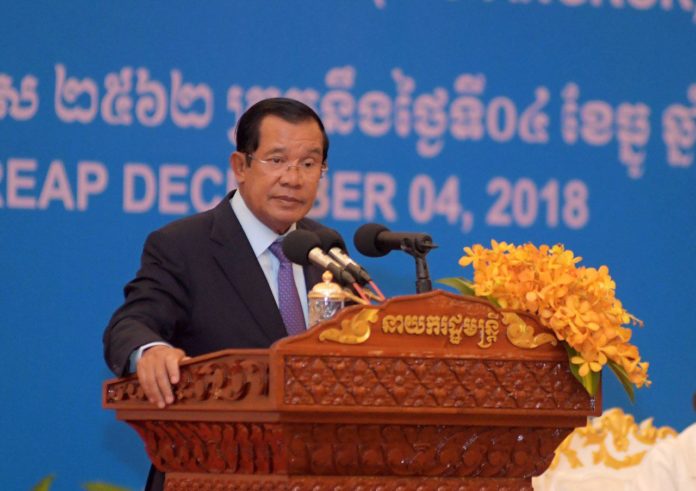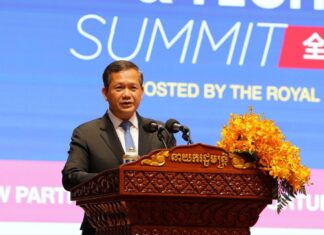Your Excellency Audrey Azoulay, Director General of UNESCO,
Your Excellency Manabu Miyagawa, Assistant Minister, Director General for Cultural Affairs of the Ministry of Foreign Affairs of Japan,
Your Excellency Eva Nguyen Binh and Your Excellency Hidehisa Horinouchi, Co-chairs of ICC-Angkor,
 Excellencies, Ladies and Gentlemen!
Excellencies, Ladies and Gentlemen!
On behalf of the Royal Government and the people of Cambodia, I am delighted to attend the auspicious opening of the commemoration of the 25th Anniversary of the International Coordinating Committee for the Safeguarding and Development of the Historic Site of Angkor (ICC-Angkor) and the 31st Technical Session and 25th Plenary session of the ICC-Angkor at this moment.
I would like to extend my warmest welcome to Madam Director General of UNESCO, distinguished delegates from France and Japan, Excellencies Co-chairs of the ICC Angkor as well as distinguished national and international guests, to the land of ancient Angkor which has thousands of years of history in Asia.
Taking this opportunity, I would like to make a happy announcement to all participants that at the 13th Session of the Intergovernmental Committee for the Safeguarding of the Intangible Cultural Heritage on 28th November 2018, in Port Louis, Republic of Mauritius, Lakhon Khol Wat Svay Andet, representing all other Lakhon Khols in Cambodia, was inscribed on UNESCO’s list of intangible cultural heritage of humanity. Lakhon Khol is the 5th intangible cultural heritage of Cambodia which has been listed after the inscription of Chapei Dang Veng on 30th November 2016, Tugging rituals and games on 2ndDecember 2015, Sbek Thom, Khmer shadow theatre on 25th November 2005, and the Royal Ballet of Cambodia on 7th November 2003. Besides the intangible cultural heritage of humanity, Cambodia has also inscribed other famous ancient archeological sites on UNESCO’s list of world heritage sites, which include Temple Zone of Sambor Prei Kuk on 08th July 2017, Preah Vihear Temple on 7th July 2008, and Angkor Wat on 14th December 1992.
On this auspicious occasion, I would like to express my deepest gratitude to His Majesty Preah bat Samdech Preah Baromneath NORODOM SIHAMONI, King of Cambodia and Her Majesty Queen-Mother NORODOM MONINEATH SIHANOUK, the Nation’s Great Mother for firmly supporting all efforts of the Royal Government of Cambodia for the cause of the nation, motherland and people.
With this, I would like to express my high appreciation to Excellencies Co-chairs of ICC-Angkor, UNESCO Office in Cambodia, Secretariat of the ICC-Angkor and national and international ad-hoc experts for contributing to the preservation and development of Angkor site over the past 25 years. I would also like to commend the management and officials of Apsara National Authority for fulfilling their jobs with the sense of responsibility and cooperating with national and international partners in preserving and developing Angkor site.
I would also like to pay tribute to Samdech Vibol Panha Sok An, former Deputy Prime Minister and President of the Apsara National Authority, H.E. Vann Molyvann, former President of the Apsara National Authority, and former management as well as national and international experts who have devoted their mental and physical effort to the preservation and development of cultural assets. I would like to request Excellencies, ladies and gentlemen to stand up and observe a minute’s silence in memory of national and international dignitaries who made great sacrifices for the cause of Angkor.
The Royal Government and People of Cambodia are very honored once again to host this historic commemoration of the 25th Anniversary of ICC-Angkor, which was hosted once in 2013 in Siem Reap. Cambodia has been fully supporting this ICC-Angkor mechanism since its establishment in 1993 in Tokyo which is initiated by the Government of Japan with the support from the Government of France and UNESCO, aimed at setting out strategies and actions for the benefit of the Angkor sites.
[Start of Comments]
In particular, this event will be honored by the signing by three parties – UNESCO, ICAPP and ICC-Angkor to serve as testimony and support to harmony among nations for their jointly unanimous decision to embark on culture as a foundation to continue to build and safeguard a sustainable world for mankind of generations to come.
[End of Comments]
I would like to express my high appreciation to ICC-Angkor for significant achievements in the preservation and development of the Angkor site over the past two decades. All projects within this mechanism require years of implementation, millions dollar of funding and thousands of experts. I would also like to take this opportunity to express my gratitude to the Government of France and Japan, and UNESCO for agreeing to expand the scope of ICC-Angkor to another world heritage site, which is the Temple Zone of Sambor Prei Kuk.
In fact, Angkor site has experienced a significant development and the number of tourists visiting Cambodia keep increasing every year. For the first nine months of 2018, around 1,570,000 tourists have visited Angkor Wat, an increase of 8.74% compared to the same period in 2017.
[Start of Comments]
This morning, the Minister of Tourism already told me that in the early eleven months of this year, we have already recorded arrivals of about two million tourists to the temple of Angkor.
[End of Comments]
Cambodia is projected to receive around 7 million and 14 million tourists in 2020 and 2030 respectively.
This event is organized while Cambodia is moving closer to the 40th anniversary of the liberation from Pol Pot genocide regime and 20th anniversary of the end of war through Win-Win policy. This achievement cannot happen without peace and political stability which enable Cambodia to continue preserving and developing cultural heritage, achieve socio-economic development and rapidly integrate itself into the regional and global arena on equal footing and with equal rights as other nations.
Meanwhile, the Royal Government of Cambodia always considers culture the national spirit and Khmer national identity, which is our invaluable asset and endless resource for sustainable economic development. Moreover, the concept “Preservation for Development and Development for Preservation” has become the roadmap for cultural sector in Cambodia. Through this, we have incorporated our cultural heritage in our growth strategy in order to achieve the socio-economic development as well as the preservation and development of tangible and intangible heritages.
Once again, on behalf of the Royal Government of Cambodia, I would like to appeal to all friend countries, national and international development partners to continue support in terms of technical, financial and human resources and relevant ministries/institutions and Cambodian people must join hands to protect and preserve the Angkor site which is cultural heritage of humanity, in short, we do it for all of us.
[Start of Comments]
Even in Armed Conflicts, We Averted Impacts on Temples
In this very important and rare meeting, please allow me to share some information regarding problems arisen in the past so that we could figure out ways to foresee what we should do in the future. This morning, while receiving HE Director of UNESCO and her delegation from Japan and France, I narrated to her our stories. I could remember that on 2 December 1987, in Fere-en-Tardenois, France, in our first meeting, Samdech Preah Norodom Sihanouk and I discussed how to avert fighting in areas where there are ancient temples. Even though there were still fighting, we made every possible effort to avert destruction and other possible impacts on temples – heritages left from our ancestors […] this issue has led to a common position of every involved parties in the time of armed conflict for nearly three decades. We did what we could to avoid armed clashes in the temples areas. However, under the regime of Pol Pot, they pulled down temples, for instance one in Kompong Cham, to collect stones to build a dam. It was lucky though that Cambodia did not cause destructions (to those temples) by shelling or bombardments.
After 1985, No Settlements and/or Hotel Construction in the Angkor Wat Area
There is this other point that I wish to stress here […] 1985, when I became Prime Minister, Angkor was not yet qualified as a heritage of the world. You may remember that in the 1960s, there were two hotels at the entrance to Angkor Wat. After liberating the country, people came and settled in area before the temple of Angkor Wat. There was also attempt to restore the two hotels from previous times. I disagreed with the restoration and I suggested to move people who settled there to liberate the area for trees planting. It has been over thirty years now […]
I have said times and again that we must not kill a hen for just one nice meal but raise it to give eggs and to hatch more chicks. It has not been easy to protect our historic heritages. I hope all of you who are present here – those who have or have not been here before – understand this country’s past and try to understand aspiration of this people for their future. As you can see that in Siem Reap there are more people, five-star hotels and many more, even more than what we have in Phnom Penh. However, please remember, when Angkor Wat became one of the world’s heritages in late 1992, Siem Reap was still a target of attack by the Khmer Rouge even in March 1993.
Temples Continued to Be Punished and Embargoed
There were not many people living in Siem Reap. We started from the two old hotels and now we have up to a hundred of them. Some of you who visit this country at its peaceful phase may have seen that everything is normal, everyone is making normal living activities, there are tourists everywhere, and they may not have thought of the past of this country. In every city in Cambodia, there were not many people living in them, Siem Reap also included. We started gradually. Angkor Wat was also punished internationally. The temples of Angkor Wat, Preah Vihear, and other temples in the country, were under political punishment and embargo from outside. We should draw some lessons from this experience which is not only for Cambodia but also for the world. We should not let historical heritages of mankind to be an object of politics.
It was a bad luck for us. Even the temple of Angkor Wat was at that time punished because Pol Pot continued to occupy the Cambodian seat at the United Nations. We could not call on anyone to provide us foreign assistance to help maintain the temples. We were lucky though when there was this Japanese professor coming to study and discuss with me on a regular basis (about possibilities to do some good thing to them). Later, the Indian government kindly sent their technical experts to help rescue the temple of Angkor Wat in the decade 1980s. This should also be a lesson for the United Nations or for other powerful countries that they should not use sanction whatsoever on heritages and cultural entities. They should not be objects of such sanctions and/or punishments.
To Enlist Temples One After the Other as World Heritages
I wish to also emphasize that managing heritages is not a simple job. We sometimes have to make decision among choices. I am raising this issue to draw out a lesson and also a political message for political parties in Cambodia not to mobilize or instigate people to occupy land in heritages areas – both those registered and not registered ones. We have so many temples in Cambodia that we are working to enlist them one after the other as world heritages. We were caught between hard choices. Sometimes, we had to accept being branded as a government that violated human rights because we had to move people from places where they settled […]
Managing World Heritages Is No Easy Job
It was true that prior to gain acceptance as a world heritage, there are certain conditions to follow. For instance, the Angkor Wat area, we are not to allow any construction of high buildings. It was unfortunate though. In Cambodia, when the elections times come, they always mobilize people to infiltrate and occupy land in or around the temples areas. What do you think we could have done? Should we respect people’s right to settlement, we could have failed conditions required to keep temples as world heritages. We had no choice but to move people and their settlements to other places. It was at this point that some had claimed that the Royal Government violated human rights and their rights to settlements […] in the Preah Vihear temple area, people settled right in the terrace of the temple. We had to find them land to move them out […] it was not an easy job. It was like holding a hot piece of stone […] I think that the Cambodian people understand better now and will not occupy illegally land in areas of temples. We will have to work together to keep heritages left by our ancestors. We are with tasks to defend and protect them.
Harmonization of Cultures
Well, these are lessons that Cambodia had learned. Cambodia will continue its partnership with international parties and with the latter’s supports we are determined to defend and protect heritages in its territory. Today, we have signed a tripartite agreement – UNESCO, ICAPP, and ICC-Angkor, that will send an important message to nations in Asia and the Pacific on issue of cultural harmonization. I hope that we continue our journey together for the sake of Cambodian successes, and those of the region, and internationally.
[End of Comments]
Finally, along with the opening of the commemoration of the 25th Anniversary of the Establishment of ICC-Angkor and the 31st Technical Session and 25th Plenary session of the ICC-Angkor at this moment, I would like to wish Excellencies, ladies and gentlemen comfortable and memorable stay in the land of Angkor of the Kingdom of Cambodia which has diverse world heritages./.






![Special Lecture by Samdech Akka Moha Sena Padei Techo HUN SEN, President of the Senate of the Kingdom of Cambodia, on “Leadership Experiences and Vision for Peace” to the 11th Plenary of the International Parliament for Tolerance and Peace (IPTP) [Unofficial Translations]](https://pressocm.gov.kh/wp-content/uploads/2024/12/468161445_1188047276010391_3141496335218348185_n-100x70.jpg)
